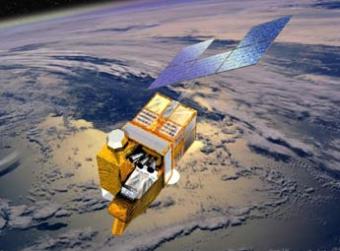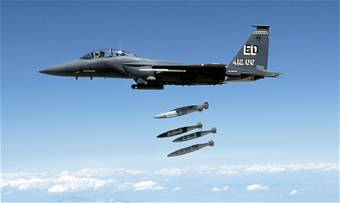Democrat July 2000 (Number 45)
Euro-military might
attempts escape from USA
Brian Denny explains the latest developments in a
rapidly changing scene where big guns and money make the orders

Germany and France agreed last month (June 2000) to cooperate on a spy satellite system that would cut Europe's reliance on US military intelligence and revives an idea previously shelved as being too expensive. Following a summit in the German town of Mainz the French and German leaders said Berlin would acquire an all-weather radar satellite system while Paris would bring its optical satellite system into the joint project.
"Germany and France intend to develop an independent European satellite reconnaissance system," a statement said after German Chancellor Gerhard Schroeder met France's President Jacques Chirac and Prime Minister Lionel Jospin. Plans for an independent statellite system were hastened following European reliance on US satellite information during last year's outlaw war against Yugoslavia.
JDAMs
Most of the 30,000 bombs dropped by the US on Yugoslavia were Joint Direct Attack Munition (JDAM) ordinance. JDAM's are precisely guided to their targets by satellite signals day and night in any weather as opposed to laser-guided munitions which are affected by heavy cloud and rain.

"We recognised in Kosovo that we have to be able to stand on our own two feet in the area of European reconnaissance. We can't rely on delivery from outside of Europe," one German official source said.
In other words the EU wants the ability to bomb who it likes when it likes without relying on US technology.
Satellite plans relaunched
Mr Schroeder's conservative predecessor Helmut Kohl pulled out of an ambitious European satellite programme with France in 1997, citing budget constraints. France was especially keen to build the Helios II and Horus satellites to make Europe independent of Washington's superior "spy in the sky" capabilities and made the project a symbol of Europe's drive for its own military identity, apart from NATO.
Germany has changed its mind since the technology is now cheaper and because the United States refused to share all its satellite intelligence with its EU allies during last year's murderous attacks in the Balkans. During the Yugoslav conflict Germany also used unmanned drones launched from bases in Macedonia to gather aerial reconnaissance but some crashed and they could not operate in poor weather.
Germany occupies the Balkans
At the summit Berlin was also congratulated by the French on it's deployment of German troops in Kosovo, it's largest military mission since World War Two. The German parliament also celebrated by extending the mandate to occupy the Serbian province with Bundeswehr troops for at least another year.
German and other NATO troops in Kosovo have overseen the ethnic cleansing of 350,000 non-Albanians and the slaughter of over 1,000 others without lifting a finger as part of the US/EU strategy of carving up the Balkans between themselves. This strategy is likely to be repeated in oil-rich Central Asia with the EU think tank, the Centre for European Policy (CEPS), demanding that France makes "stability" in the Caucasus a priority of its presidency which began this month.
The idea drawn up by, of all people, former Turkish president Suleyman Demirel includes plans for a stability pact based on the one imposed on the Balkans which included the illegal imposition of the German currency on half of Yugoslavia.
Arms consolidation drive
The drive towards creating a single military-industrial complex in Europe was also strengthened when German Defence Secretary Walther Stuetzle announced that Germany, France, Italy and the Netherlands have ordered 366 NH90 military transport helicopters for around £6 billion.
The Eurocopter unit of European Aeronautic Defence and Space Company (EADS) - a merger of DaimlerChrysler's aerospace unit, France's Aerospatiale Matra and Casa of Spain - has a 63 per cent share of the NH 90 project. The NH 90 has become one of the world's most drawn out military equipment programmes which began in the 1980s with the multi-billion pound Eurofighter white Elephant.
Washington has attempted to slow down European arms consolidation by linking up the US arms giant Raytheon with the French arms group Thomson-CSF. However, the Pentagon is very nervous about sharing sensitive information with Thomson, particularly around air defence command systems.
Military hardware slush funds
Another signal that the European arms manufacturers are gearing up for an intense arms race is the building up of offshore slush funds, to pay huge "commissions" to win contracts, to avoid new anti-corruption rules. A London conference on financial crime heard OECD chair of a working party on corruption Mark Peith say: "many companies are building slush funds because they want to retain the option to bribe."
The tradition of bribing countries to buy huge amounts of armaments has been long employed by the US military-industrial complex. For instance US defence secretary William Cohen secured sales of £2,000 million of Lockheed Martin military hardware to Egypt last year by offering huge "commissions" including £1,000 million in US military "aid."
Star Wars attacked
Paris and Berlin also attacked the US plans for building a "Star Wars" National Missile Defence (NMD) system in contravention of the 1972 Anti-Ballistic Missile treaty Russia signed with the US. Washington wants to build a so-called £7 billion "defensive" nuclear missile shield in order to feel free to attack whoever it likes with impunity.
Not surprisingly, other western states are not at all happy with such a prospect. "Germany and France have the same analysis of the terrible consequences an NMD system could have on the ABM treaty," Mr Chirac said after a twice-yearly Franco-German summit.
Franco-German axis
It seems that the axis driving the eurofederalist juggernaut is keen to block further US advances in the growing arms race between Washington and Brussels. The EU mandarins are also determined to increase their own military capability in order to outflank their US imperial rival in the race to grab control of the world's resources for their own empires.